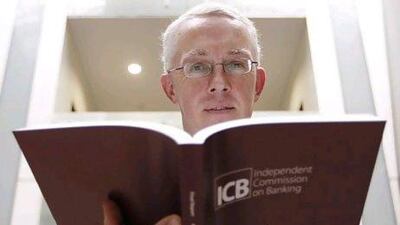Britain's banks will be among the most rigidly regulated in the world if the recommendations of the Independent Commission on Banking (otherwise known as the Vickers report) are implemented, but you still have to fear for the future of the UK financial industry.
The report, published on Monday after much public debate and leaking of proposals, seems deeply flawed in several crucial respects.
Although I am no mouthpiece for the bankers who brought the world to the brink of financial collapse in 2008, you have to wonder whether John Vickers, the head of the ICB, wouldn't have been better advised to take more seriously the views of the professionals before he published.
As it stands, the proposals look to be yet another nail in the coffin for the UK's financial services industry, which has been the country's main earner for decades, but which has also been in slow decline for just as long.
Whether there will still be a British financial industry of any global significance to speak of in 2019, when the proposals are due to be implemented, is now a matter for serious consideration.
The main recommendations are easily summarised: the "ring-fencing" of the banks' retail activities from their riskier investment banking businesses; the establishment of separate boards and executives to run the ring-fenced activities; and new capital requirements to ensure that retail and small-business operations are backed by sturdier resources in times of crisis.
These measures, the report insists, will protect the UK's banks from a repetition of the catastrophe of 2008, when the state took over two of the biggest, Royal Bank of Scotland and Lloyds, and injected some £66 billion (Dh383.19bn) of emergency equity into them in the form of a taxpayer bailout.
With the current global financial crisis depressing shares of most European financial institutions, and with little likelihood of a change in prospects for years to come, there is no chance the British government will be able to sell down its holdings in RBS and Lloyds at anything like the value at which it took them.
The Vickers report was intended to bolster the value of the UK banks by making them watertight against future crises, but events have moved beyond that prospect now. The measures just announced will do little to enhance value, and a lot to destroy it.
The report, it seems to me, was predicated on a misreading of the causes of the crisis of 2008. For example, the biggest single reason for the near-collapse of the world financial system bank then was the catastrophic failure in the US of Lehman Brothers, which was wiped out virtually overnight with billions of dollars of liabilities in global markets.
No amount of ring-fencing could have shielded the British banks from that disaster.
The second misunderstanding contained within the report is that it underestimates the power of individuals to affect the fortunes of big corporations.
RBS was so vulnerable to the financial storm generated by Lehman because it had allowed one man, Sir Fred Goodwin, then the chief executive, too much power to make risky deals on the corporate mergers and acquisitions markets.
Again, it's hard to see how ring-fencing could have stopped Sir Fred from blowing RBS's capital on the acquisition of ABN Amro, nor would it have been any more effective in reining in his autocratic boardroom style than the supine board of which he was head.
Better-applied corporate governance rules and stronger-willed non-executives should have acted against him back then. The Vickers report will not improve this situation.
With Lloyds TSB, the other crock in the British financial system, the crisis was also exacerbated by the actions of a powerful individual, but in this case it was Gordon Brown, then the prime minister, who did the damage. He forced through the merger with Halifax Bank of Scotland that did for Lloyds.
How effective will ring-fencing be in withstanding the power of the prime minister's office in the future? Not very, would be my guess.
Barclays and HSBC, those UK banks that came through the 2008 crisis without having to go begging for government assistance, will be particularly aggrieved at the Vickers proposals. They will have to pick up their share of the estimated US$7bn (Dh25.7bn) cost of the new measures, with no apparent benefit.
Both have already made noises about moving their global headquarters out of Britain, and the report will only accelerate those moves. It will not be surprising if both have flown, Barclays to New York, HSBC to Hong Kong, by the time the proposals are in place eight years from now.

